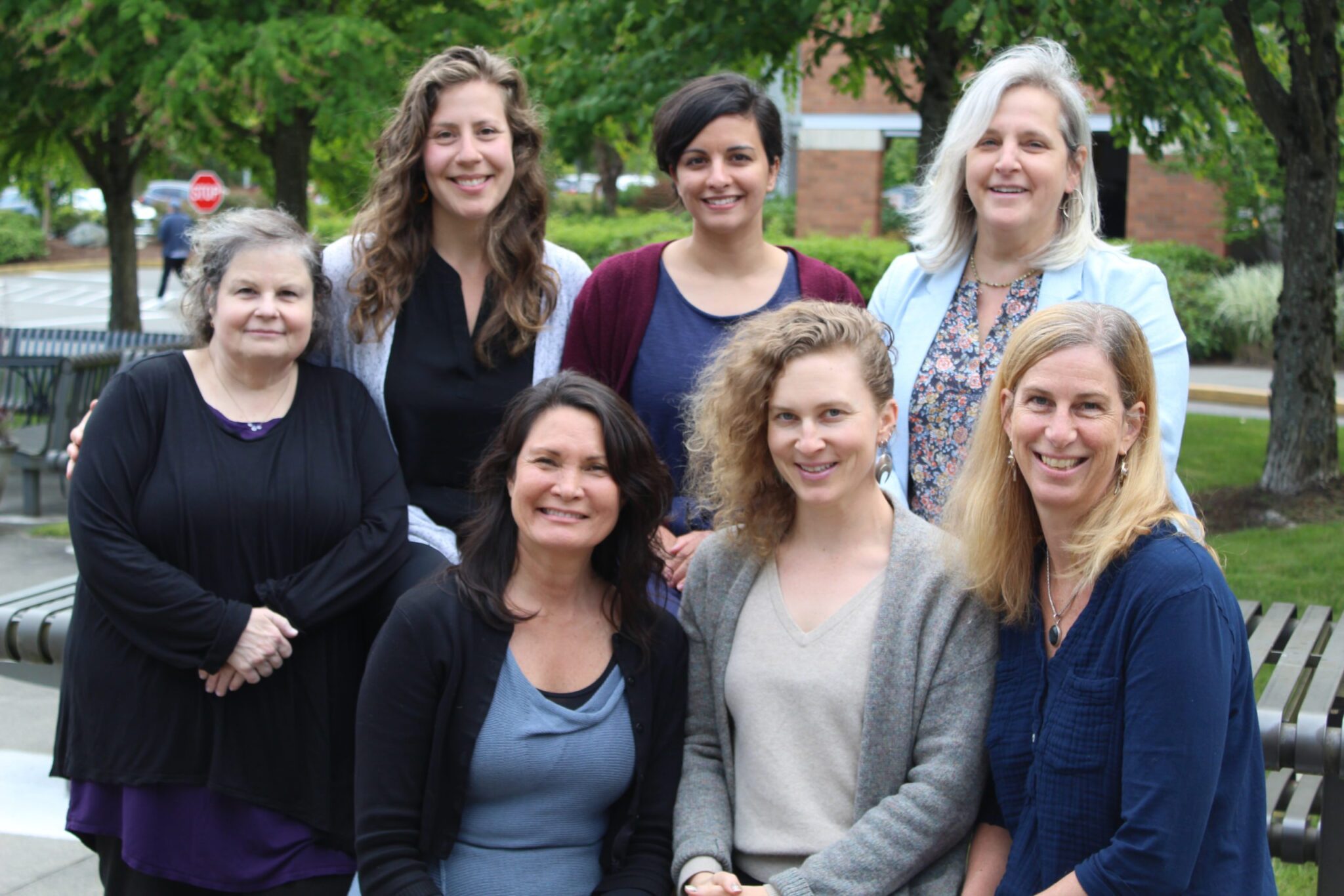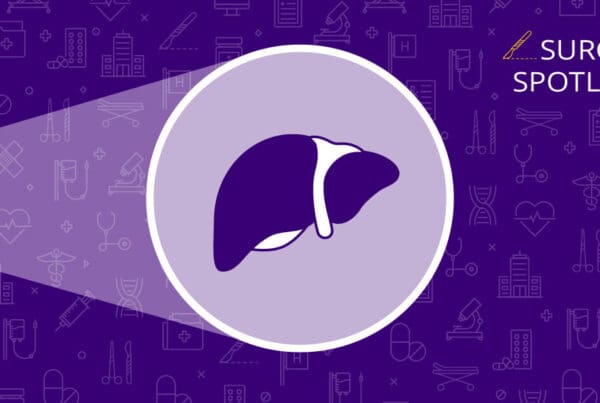Highlights | Midwives Clinic turns 10
- The Midwives Clinic at UW Medical Center – Northwest opened in Oct. 2011.
- Teamwork of nurse-midwives and other specialty providers benefits birthing people and their babies.
- Says one clinic patient: Midwifery exemplifies what healthcare should be.
Celebrations happen often at UW Medical Center – Northwest. Here, mothers give birth with assistance from a certified nurse-midwife (CNM) nearly every day. In October, the Midwives Clinic at UW Medical Center – Northwest has its own reason to celebrate: It turns 10 years old.
Mary Lou Kopas, MN, CNM, was one of five certified nurse-midwives on staff when the clinic opened in October 2011. Newly out of graduate school, she attended the first birth — a baby girl.
Today, Kopas is chief of midwifery, and the clinic has expanded to seven CNMs, soon to be eight. CNMs have attended nearly 3,000 births since the clinic’s founding. These nurse-midwives have also advanced the practice through additional training in psychiatric nursing, ultrasound, infertility assessment and telehealth.
The clinic is truly a group practice, which means the midwives share their patients with few exceptions. Pregnant people are encouraged to meet the entire team during prenatal visits so when labor starts, they always have someone they know caring for them.
Kopas describes the difference in patient care between an obstetrical practice and the Midwives Clinic as subtle, but powerful.
“We have a little more time to be face-to-face [with patients], to educate them and explain what’s happening throughout their pregnancy and birth,” Kopas says.
“Our approach, our philosophy is different,” she says, describing it this way: “This is your body, your birth. We’re here to support you.”
Patients embrace the approach. “The midwives and staff exemplify what and how healthcare should be provided,” one patient wrote in a survey response. “They are kind, listen and hear you, and are experts in the field.”

Top row (left to right): Cindy Rogers, Chana Schaffer, Yasmeen Bruckner, Mary Lou Kopas. Bottom row (left to right): Mary Bolles Holder, Victoria Swarthout, Deborah Blue.
How the Midwives Clinic began
The original midwifery service began with Cindy Rogers, CNM, and Bonnie Bernstein, ARNP, CNM, when they started practicing more than 20 years ago at UW Medical Center – Montlake with the support of Thomas Easterling, MD, and others. In 2011, midwives moved to Northwest and opened the clinic.
Edith Cheng, MD, chief of service for obstetrics, was instrumental in the growth of midwifery at UW Medicine, both in the Midwives Clinic at UW Medical Center — Northwest and with the midwives who practice today at Montlake. Ali Lewis, MD, FACOG, a clinical instructor in obstetrics and gynecology, is medical director of the Midwives Clinic and an advocate for the model of care practiced by midwives.
Over the past 10 years, changes to the Midwives Clinic’s practice have included renovations at Northwest to create new labor and postpartum rooms and a stronger team approach with obstetrics and gynecology, perinatology, family medicine, neonatology and nursing.
Midwives focus on low-risk pregnancies, but they tap experts in the UW Medicine system if complications arise during pregnancy or birth. For example, Kopas points out if a woman labors but needs a cesarean section, her nurse-midwife will help assist an obstetrician and support the mother during and after birth.
The Midwives Clinic provides services beyond labor and delivery to women from their teenage years through menopause, including:
- Breastfeeding education and support
- Family planning and birth control
- Newborn care in the first days of life
- Preconception and postpartum care
- Primary and gynecologic care
- Sexually transmitted disease screening
Midwifery is on a mission and on the rise
Certified nurse-midwives have degrees in nursing, graduate-level education in midwifery and must pass a national certification exam. Nationally, the number of births attended by certified nurse-midwives and certified midwives has increased from 8.8% in 2016 to 9.9% in 2019, according to the U.S. Department of Health and Human Services.
Many published studies report that in regions where nurse-midwives practice, there are fewer medical interventions, lower incidence of cesarean sections, less use of epidurals and a lower risk of severe lacerations to the mother. In a four-part series on midwifery in 2014, The Lancet described midwife care as “cost-effective, affordable and sustainable” and with far-reaching effects on maternal and child health worldwide.
Surveys of Midwives Clinic patients reflect high satisfaction with the quality of their care.
“All of the midwives at Northwest have helped me go through the amazing, scary, profound experience of giving birth for the first time,” one patient wrote. “[They] always made me feel like I was in excellent hands, and they really alleviated a lot of anxiety I had about going into labor.”
Wrote another mother: “I had such a smooth, positive pregnancy, and I give so much credit to the care I received from each and every one of the midwives. At every visit [the clinic staff] greeted us with warmth and kindness, consistently putting us at ease. Always friendly and professional. Each of the midwives took the time to answer every question we had and NEVER made us feel rushed or foolish.”
Midwives care for patients when they are vulnerable
To Kopas, a key ingredient in midwife care is the time they spend getting to know patients and educating them during preconception and prenatal visits. Nurse-midwives are then at hand throughout labor and delivery. They maintain a calm, peaceful environment with encouragement and guidance in managing pain. This may include massage, water immersion in labor tubs, deep relaxation and aromatherapy — as well as pain medication if the patient chooses.
“When you’re pregnant, you’re very vulnerable,” Kopas explains. “The subtleties of how you’re treated make a big difference. And in labor, even more so. If you’re by yourself, lying in bed, having painful contractions, of course, you’re going to say, ‘Give me an epidural!’ Just the presence of a calm, supportive birth attendant can be very powerful. We might also suggest helpful positions and activities. And our wonderful nurses help us create a peaceful environment that allows labor to progress and helps the laboring person cope.”
Midwives, she says, remind patients, “Labor is a journey. And I’m going to help you. No matter what happens, we’re going to get through it.” For a laboring patient, “someone who believes in your ability to do it makes a huge difference.”
Midwifery care for all pregnancies
Whether it’s your first time giving birth or you’re a seasoned pro, you have a high or low-risk pregnancy, or you are simply looking for a wellness exam, UW Medicine’s Midwifery Services offers the maternity and gynecologic care you need.
The Birth Center at UW Medical Center – Montlake
The Montlake campus birth center is equipped to handle low and high-risk pregnancies.
Should you need additional care, your certified nurse midwife will collaborate with a maternal-fetal medicine specialist to keep you and your baby healthy. The nearby Level IV neonatal intensive care unit (NICU) means you also have instant access to special monitoring and treatment after delivery if needed.
The Childbirth Center at UW Medical Center – Northwest
The certified nurse midwives at The Childbirth Center provide expert care before, during and after the birth of your child. This includes lab tests and physical exams, labor support and trained assistance with lactation. During labor, you will have access to medication, epidural anesthesia and additional comfort methods like labor tubs and aromatherapy.
The center also offers a variety of childbirth preparation classes, such as Lamaze, hypnobirthing, breastfeeding, infant care and CPR.


